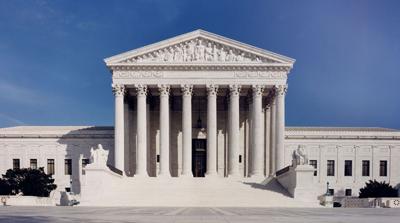
WASHINGTON – The U.S. Supreme Court doesn’t want to hear the arguments of a large company that claims it is unfair plaintiff lawyers have picked Philadelphia as their preferred destination to sue, even though most of their clients don’t live in Pennsylvania.
On Oct. 6, the court declined to review Syngenta’s appeal of a ruling that allows lawyers to pursue 1,100 lawsuits in Philadelphia’s mass-tort program. The cases allege the herbicide Paraquat causes Parkinson’s disease, and the first one set for trial was settled beforehand this summer.
Syngenta is headquartered in North Carolina and was attempting to put a stop to what it called cherry-picking by plaintiff lawyers. Its case was a chance for SCOTUS to review a decision called Mallory, which essentially says a company consents to be sued in Pennsylvania simply by registering to sell its products there.
Syngenta pushed the idea Pennsylvania’s consent-by-registration law violates the Dormant Commerce Clause, which limits how states can regulate commerce. It was an issue not presented during the Mallory proceedings.
“The majority did not resolve the serious due process concerns arising from subjecting out-of-state entities to broad general jurisdiction based on minimum contracts and the mere act of (mandatory) registration,” Syngenta argued.
The Mallory ruling helped lawyers use a Philadelphia court that has issued blockbuster verdicts. About 90% of plaintiffs suing over Paraquat there are from out-of-state.
Juries in Philadelphia sometimes welcome the chance to hammer corporate defendants. For example, a jury hearing claims the weedkiller Roundup awarded $2.2 billion, and another jury gave $725 million in a case against Exxon Mobil over alleged benzene exposure.
Business and legal reform groups urged the U.S. Supreme Court to hear Syngenta’s appeal, claiming the effect of Mallory has been “widespread abuse… for forum shoppers who prefer plaintiff-friendly Commonwealth courts…”
"Businesses will now think twice about whether to conduct business in the Commonwealth, at significant cost to the state's financial well-being,” their brief said.
But plaintiff firms Motley Rice, The Miller Firm and Wagstaff Law Firm fought to keep their Paraquat cases in Philadelphia, saying the Syngenta case was a poor vehicle for reconsidering Mallory.
There is no final decision to be appealed, they argued, claiming Syngenta “jumped the gun.” It appealed the denial of its preliminary objection on personal jurisdiction, and both the Superior Court and Supreme Court of Pennsylvania refused to hear its argument.
“Not only is Mallory barely two years old, it also explicitly did not create new law,” they wrote, saying it simply reaffirmed a 1917 decision. Mallory was a complicated 5-4 ruling described as actually a 4-1-4 vote.
Juries in Pennsylvania gave out the third-most of any state last year - $3.4 billion - said a study by Marathon Strategies. And Pennsylvania’s rules were copied in Illinois legislation this year, with Gov. JB Pritzker in August signing SB328 despite calls from the business community for a veto.
“By failing to reject this disastrous proposal, businesses and taxpayers will now be vulnerable to predatory lawsuits that will clog up our legal system and stymie our economic growth,” a coalition of business groups that opposed the bill said in a statement.
“Rather than moving to Illinois and creating new jobs and economic investment, many businesses will avoid our state entirely, undermining the momentum our state has worked so hard to create.”




